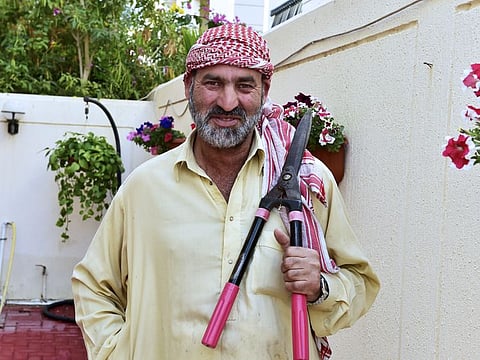Coronavirus: How UAE residents in shared spaces are coping
Expats talk of how they maintain social distancing, cleanliness in their accommodations

Dubai: Expatriates in shared accommodations are often asked how they maintain social distancing and ensure sanitation and hygiene. Gulf News caught up with some bachelors and single women who live in such spaces to find out. Here’s what they had to say:
‘Our space is large enough to keep a distance’
Khan Zamin Abdul Qadir Khan, 55, originally from Pakistan, works as a gardener in Jumeirah and shares his place with six others.
“We live in a compound in a large room. The rent is Dh4,400 per month which none of us could afford. So as relatives from one single village - Maidan in Peshawar – we decided to take it. Prior to the COVID-19 breakout, we were 12 peo-ple in this space. Now, many five of them lost their jobs and flew back to Pakistan, so there are seven of us left. The space is large enough for us to keep our distance,” said Khan, noting that they were three gardeners and four drivers.
“We have invested in a common fund to buy cleaning products like disinfectants, sanitisers, hand soaps, tissues, masks and gloves. Our room is large and there are four bunk beds. We have a common toilet and one kitchen. We take turns to clean our place. There is one person in our compound who does the cooking. Usually, he makes a curry based dish – either vegetarian or meat or chicken. He makes sure he wears a mask. All of us are at home and no one goes out, so there is no risk of any external contamination. We have managed well so far and hope to do so in the future too,” he added.
‘Additional cleaning is expensive, but we split the costs’
Sheila Betancourt Gonzales, a beauty salon worker from the Philippines, lives in an apartment with a large living room and one bedroom with 12 compatriots. The people she shares her apartment are employed in schools, offices and the services sector.
Cleanliness runs high on their ‘to-do list”, she claimed.
“All of us are home, so there is minimum risk of infection. For groceries we spend individually but for cleaning, we pitch in together. So if one buys the floor cleaner, another buys the dish washing liquid; a third pays for the detergent, a fourth hand sanitisers and so on. The additional cleaning has been expensive, but by splitting the expenses, we are able to manage the budget and maintain a very decent standard of cleanliness and hygiene. We clean and sanitise the toilet and kitchen very thoroughly as well as vacuum our partition spaces and bunk bed areas. Washing bed linen, towels etc is being done everyday and so far, we are all healthy. Being together gives us the courage and strength to manage our moods and keep our stress levels low. There are some amongst us who have lost their jobs in the current crisis. We even contribute to provide food for one of them. This person in turn takes on extra cleaning and sanitisation jobs. We are all doing quite well for ourselves,” she added.
‘We follow the necessary protocol on hygiene’
Shiv Kumar Gupta, 35, from India who works for a cleaning company lives with three others in a one-room apartment in Bur Dubai. “My 18-year-old nephew who had come on a visit visa is stuck here as he could not fly out on time. So, currently he is also with us.”
He said maintaining cleanliness has helped all of them keep healthy so far.
Gupta said with so much awareness launched by the authorities on cleanliness and sanitisation, he and his roommates have made every effort to follow the tips.
“The roads below our apartment were disinfected and the entire area sanitised. So we decided we would maintain a good hygiene standard in our place. Every day, we do two rounds of cleaning. We not only vacuum clean the place and mop with strong floor cleaners, we also use disinfectants around the beds, wipe door handles and knobs etc. We are also able to maintain social distancing to the extent possible. My nephew sleeps in the kitchen and the rest of us on our re-spective bunk beds. None of us goes out for work and groceries are available right below the building. We use gloves, masks and sanitisers even when we step down to get the groceries,” Gupta added.
‘Using common areas one at a time, prompt cleaning helps’
Alvin Nirmal, 28, an Indian expatriate from Kerala, India, works as an interior designer and lives in a large apartment with three partitions in Hor Al Anz.
Nirmal said: “Prior to COVID-19, we were 15 people, five in one partition. We are all from India, Pakistan and Bangla-desh. Now the expatriates in one partition have left and although we do not use that apace, there is much less pressure on common utility areas like the kitchen and two washrooms. We make it a point to maintain cleanliness to the best of our abilities. In the kitchen, one person at a time does his cooking to avoid any close contact. A charity organisation has distributed sanitisers, face masks and gloves to us and they have been very helpful. Each one of us cleans and sanitises the kitchen after cooking and using the washroom. It has served us all well,” he added.






